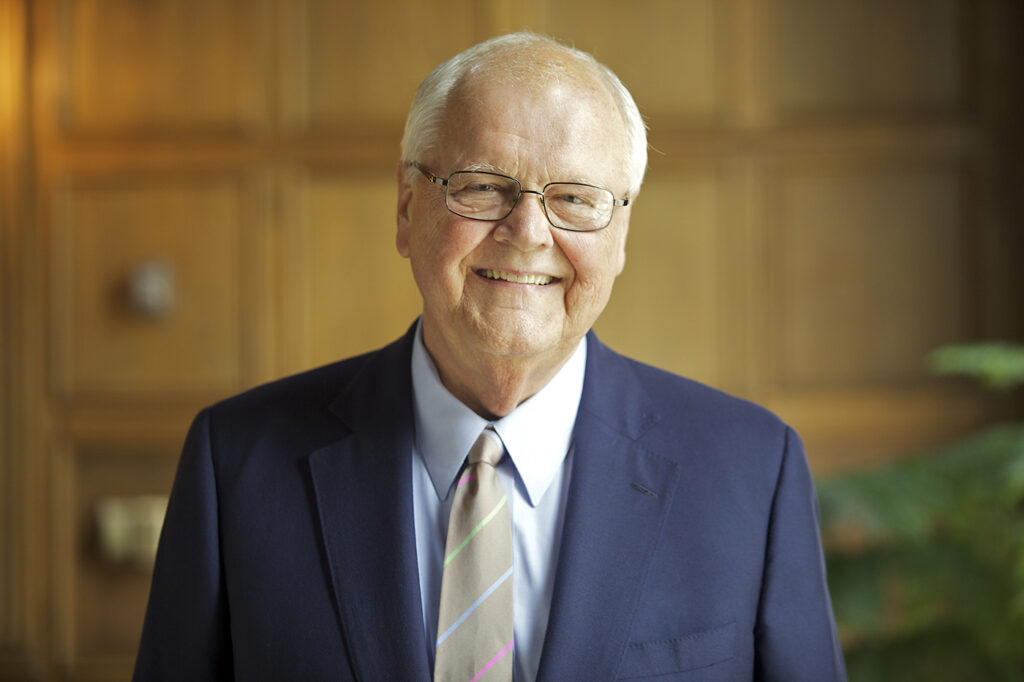
James Wright was a historian, professor, U.S. Marine veteran, and Dartmouth president. He joined the College’s History Department in 1969, served as Dean of the Faculty from 1989 to 1997, and was provost from 1997 to 1998. In 1998, he entered the Wheelock Succession and served as Dartmouth’s 16th president until 2009. On October 10 of this year, President Wright passed away from cancer at the age of 83.
President Wright grew up in Galena, Illinois, a small, working-class town that he described as a “community where most people did not think about going to college.” Upon his graduation from high school, he assumed that he was destined for the nearby coal mines or factories. At age 17, he enlisted in the United States Marine Corps and deployed to Japan, where he served during the 1958 Second Taiwan Strait Crisis. Thereafter, he returned home, set out to be a high school history teacher, and enrolled at the University of Wisconsin-Platteville. While an undergraduate, he worked various jobs, including as a janitor, factory worker, and powderman in local mines. He earned his bachelor’s degree, went on to study the political history of the American west, and earned his PhD.
In 1969, as Wright was finishing his doctoral studies, the Dartmouth History Department was looking to hire. He took the job and promptly relocated to Hanover. In the ’70s, while still awaiting tenure at the College, Wright was at the center of change: the decade saw the College’s first female students, and diversity was gaining traction. In the ’80s and ’90s, he took on numerous administrative roles, and, after President James Freedman stepped down in 1998, Wright was chosen to take the helm.
As Dartmouth’s president, Wright launched a fundraising campaign that raised more than $1.3 billion. At the time, it was the largest fundraising effort in Dartmouth history. Those funds supported enhanced financial aid, intellectual programs, and new facilities, including Berry Library, Rauner Special Collections Library, Kemeny Hall, and the Haldeman Center. President Wright also prioritized diversity and successfully sought the creation of Dartmouth’s Native American Studies Program. He also chaired a committee to evaluate the then-newly established D-Plan, now a quintessential part of the Dartmouth experience.
As a historian and scholar, Wright authored many books, ranging from American political history, to the western frontier of the United States, to our nation’s history in battle. The Progressive Yankee: Republican Reformers in New Hampshire and The Politics of Populism: Dissent in Colorado were histories of government, while Those Who Have Borne the Battle: A History of America’s Wars and Those Who Fought Them explores our nation’s battles through soldiers on the ground. After he passed, professors Robert Bonner and Colin Calloway praised his apt sense of history. CNN anchor Jake Tapper was a student in Wright’s class, History of the American West, in 1988; according to Tapper, the class inspired in him a lifelong passion for history. President Wright was, to be sure, an impassioned scholar of our past.
Perhaps Wright’s most indelible achievement, however, dealt with yet another subject on which he possessed great passion: veterans. The son of a World War II veteran and a veteran himself, President Wright spent his career advocating on behalf of those who serve. Wright wrote numerous books and articles about America’s responsibilities to its servicemen and women. He also achieved great success in his efforts to encourage veterans to attend Dartmouth.
Margaret Darrow, Professor of History Emerita, praised Wright’s inclusion of wounded veterans into the community, observing that “his thoughtful help of wounded veterans is well known, but perhaps less well known is how much these young people enriched Dartmouth.” As President Wright understood, we can all learn a thing or two from those who fight for us. Significantly, Wright was the only Ivy League president to have served in the Marine Corps.
President Wright also prioritized access to education for first-generation students. Well aware of his own first-generation, working-class origins, Wright proudly described himself as the only Ivy League president to have ever set off dynamite, which he had done while working in a mine. Ultimately, Wright provided to Dartmouth an experience unlike the prestigious and exclusive norm, and he made its education available to more students. (As one who has reaped the benefits of such initiatives, this author is wholeheartedly appreciative). Wright was, as Jake Tapper said, “never an elitist.”
President Wright was an honorable man whose contributions to our school, and more so to our nation, are commendable. He no doubt moved the quality of our education forward and left an enduring legacy for which we may all be grateful. But as another Veteran’s Day comes and goes, let us all be sure to pay tribute as well to his service as a marine—and to that of the many others who have made and continue to make great sacrifices for our freedom.

Be the first to comment on "President James Wright, a Proud Marine, Passes"